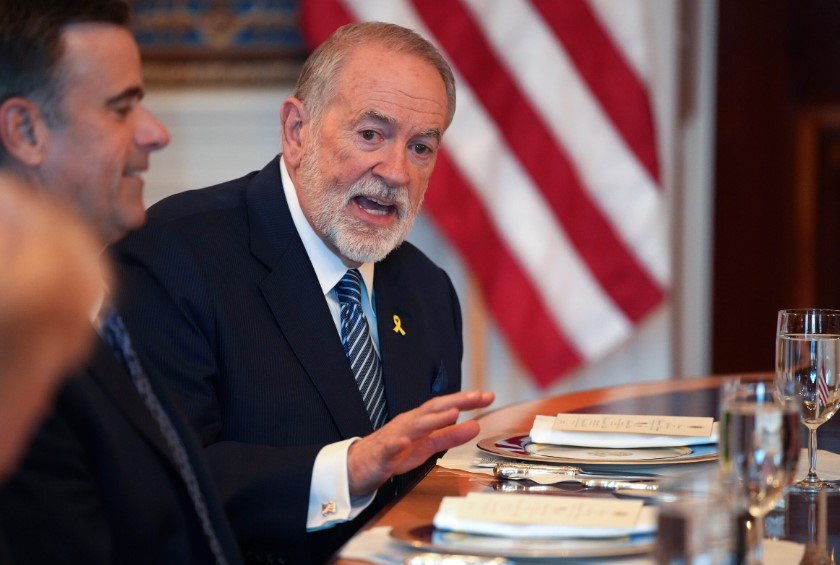Huckabee’s warning sparks rapid reversal in Israel’s Christian tourism freeze
When a leaked letter from U.S. Ambassador Mike Huckabee shook Israeli politics last week, few expected such swift movement. The Trump-era governor turned diplomat accused the Israeli government of effectively shutting its doors to Christian visitors—a claim that stunned many of Israel’s strongest supporters in the American evangelical community.
Now, less than a week later, Huckabee says the dispute is over.
“The issue has been resolved to everyone’s satisfaction,” Huckabee wrote Monday on X (formerly Twitter). “The strong support that Israel enjoys from American evangelicals will continue.”
At the heart of the conflict was a sharp and unexplained drop in tourist visas granted to evangelical Christian groups since the beginning of 2025. These delays coincided with a quiet government crackdown on religious nonprofits, prompting speculation that some missionary-linked organizations were under increased scrutiny.
But it wasn’t until Huckabee went public that the issue exploded into a full-blown diplomatic headache.

A diplomatic letter leaks, and evangelical tempers boil
The controversy began when a scathing private letter Huckabee sent to Israel’s Interior Ministry found its way into reporters’ inboxes. In it, the ambassador accused Jerusalem of reneging on a decades-old understanding between the two nations—one that guaranteed visa access for hundreds of Christian tour groups, ministries, and outreach organizations.
He even went as far as threatening to declare publicly that “Israel no longer welcomes Christians.”
The timing was delicate. Israel is already facing growing international condemnation over its military operations in Gaza and struggling to maintain broad Western support. Alienating a cornerstone of American political backing—the evangelical base—was a risk few Israeli officials wanted to take.
By Monday, the political math had changed.
The players behind the scenes
The resolution, according to Huckabee, came quickly once high-level officials got involved. He credited Interior Minister Moshe Arbel for personally intervening and suggested the delays stemmed more from bureaucratic fog than ideological rejection.
Attorney Calev Myers, who represents around 150 Christian organizations operating in Israel, played a key role in mediating the fix. According to sources close to the negotiations, Myers laid out specific policy gaps that had emerged between visa offices and the groups seeking entry.
The Prime Minister’s Office, too, reportedly weighed in behind the scenes, likely recognizing the broader damage a prolonged rift could do—particularly in an election year in the U.S., where Christian support for Israel often translates directly into Republican political capital.
Christian visits to Israel: A vital religious and economic pipeline
Evangelical tourism isn’t just symbolic—it’s lucrative. Christian visitors make up nearly 20% of all incoming tourists to Israel annually, many on organized trips that spend tens of millions of dollars across Jerusalem, Galilee, and the Dead Sea region.
Top 5 countries for Christian tourism to Israel (2024):
| Rank | Country | Number of Christian Visitors | % of Total Tourists |
|---|---|---|---|
| 1 | United States | 812,000 | 18.7% |
| 2 | Brazil | 312,000 | 7.2% |
| 3 | Philippines | 275,000 | 6.3% |
| 4 | Nigeria | 201,000 | 4.6% |
| 5 | South Korea | 189,000 | 4.3% |
These numbers help explain why even the perception of hostility toward Christian groups sent shockwaves through Israel’s tourism and foreign affairs sectors.
Beyond the paperwork: A deeper trust issue
For many evangelical leaders in the U.S., the visa issue tapped into long-standing concerns about religious equality in Israel. Some worry that Christian groups, especially those with a missionary tilt, are increasingly viewed with suspicion—despite decades of support for Israel from U.S. churchgoers.
“This was never just about paperwork,” said a senior evangelical pastor in Texas who asked not to be named. “It’s about whether we’re still considered friends, or whether we’re now seen as a nuisance.”
Christian visa delays: A timeline of tension
-
January 2025: Reports begin surfacing of visa rejections for evangelical ministries
-
March 2025: Interior Ministry opens investigations into several Christian NGOs
-
July 15, 2025: Huckabee’s letter is leaked to the press
-
July 21, 2025: Huckabee announces the resolution via X
Huckabee’s brand of diplomacy
Mike Huckabee has long walked a tightrope between diplomacy and activism. Known for his outspoken Christian views and deep ties to conservative U.S. voters, he has made evangelical access to Israel a centerpiece of his ambassadorship.
His blunt letter caught many in the Israeli bureaucracy off-guard—but it also worked.
“It’s classic Huckabee,” said a former U.S. diplomat familiar with the matter. “He speaks to his base back home and forces the issue with a public spotlight. That’s not how traditional diplomacy works, but it’s effective when your audience is watching Fox News and wants results fast.”
A warning not easily forgotten
Though the immediate crisis appears resolved, observers say the incident may leave a lasting imprint on how Christian groups engage with Israeli institutions—and how quickly U.S. envoys are willing to escalate when quiet negotiations fail.
-
Key takeaways from the visa dispute:
-
Israel paused or slowed Christian visa approvals without clear communication
-
U.S. evangelicals view Israel as a religious ally, not just a political one
-
Diplomatic leverage shifted quickly after Huckabee’s public threat
-
Interior Ministry restored the previous visa process under pressure
-
Trust may take longer to fully rebuild
-
For now, the visa taps are back on. But the message has been sent: even Israel’s closest friends expect to be treated like allies—and aren’t afraid to go public when they feel ignored.
